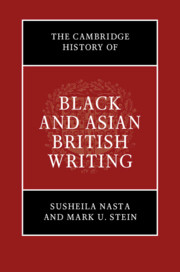Book contents
- The Cambridge History of Black and Asian British Writing
- The Cambridge History of Black and Asian British Writing
- Copyright page
- Dedication
- Contents
- Notes on Contributors
- Preface and Acknowledgements
- Introduction
- Part I New Formations
- Part II Uneven Histories
- Part III Writing the Contemporary
- (I) Looking Back, Looking Forward
- 26 Diasporic Translocations
- 27 Reinventing the Nation
- 28 Reclaiming the Past
- 29 Expanding Realism, Thinking New Worlds
- 30 Writing Lives, Inventing Selves
- 31 Black and Asian British Women’s Poetry
- (II) Framing New Visions
- Select Bibliography
- Index
29 - Expanding Realism, Thinking New Worlds
from (I) - Looking Back, Looking Forward
Published online by Cambridge University Press: 19 December 2019
- The Cambridge History of Black and Asian British Writing
- The Cambridge History of Black and Asian British Writing
- Copyright page
- Dedication
- Contents
- Notes on Contributors
- Preface and Acknowledgements
- Introduction
- Part I New Formations
- Part II Uneven Histories
- Part III Writing the Contemporary
- (I) Looking Back, Looking Forward
- 26 Diasporic Translocations
- 27 Reinventing the Nation
- 28 Reclaiming the Past
- 29 Expanding Realism, Thinking New Worlds
- 30 Writing Lives, Inventing Selves
- 31 Black and Asian British Women’s Poetry
- (II) Framing New Visions
- Select Bibliography
- Index
Summary
The world of Salman Rushdie’s 1981 novel Midnight’s Children is often cited as exemplary of a new wave of experimentation in British writing, a tradition drawing, as some have argued, from world-famous figures like the Columbian Gabriel Garcia Marquez, or earlier mentors such as the philosopher-turned-novelist and dramatist G. V. Desani. Rushdie’s so-called reinvention of ‘magical realism’ has often been said to have sparked the publication of a series of similarly hyper-realist and expansive novels by other subcontinental and British Asian writers. However, as Rushdie himself has noted, Midnight’s Children was not surrealistic but ‘realist’ and drew on the jangling contradictions of the India he grew up in. This chapter examines how a number of others, such as Ben Okri (The Famished Road), Pauline Melville (The Migration of Ghosts), Ravinder Randhawa (A Wicked Old Woman), and Helen Oyeyemi (The Icarus Girl) embrace ‘alternative’ versions of ‘reality’ and create differently constituted physical and cultural worlds.
- Type
- Chapter
- Information
- The Cambridge History of Black and Asian British Writing , pp. 485 - 498Publisher: Cambridge University PressPrint publication year: 2020

